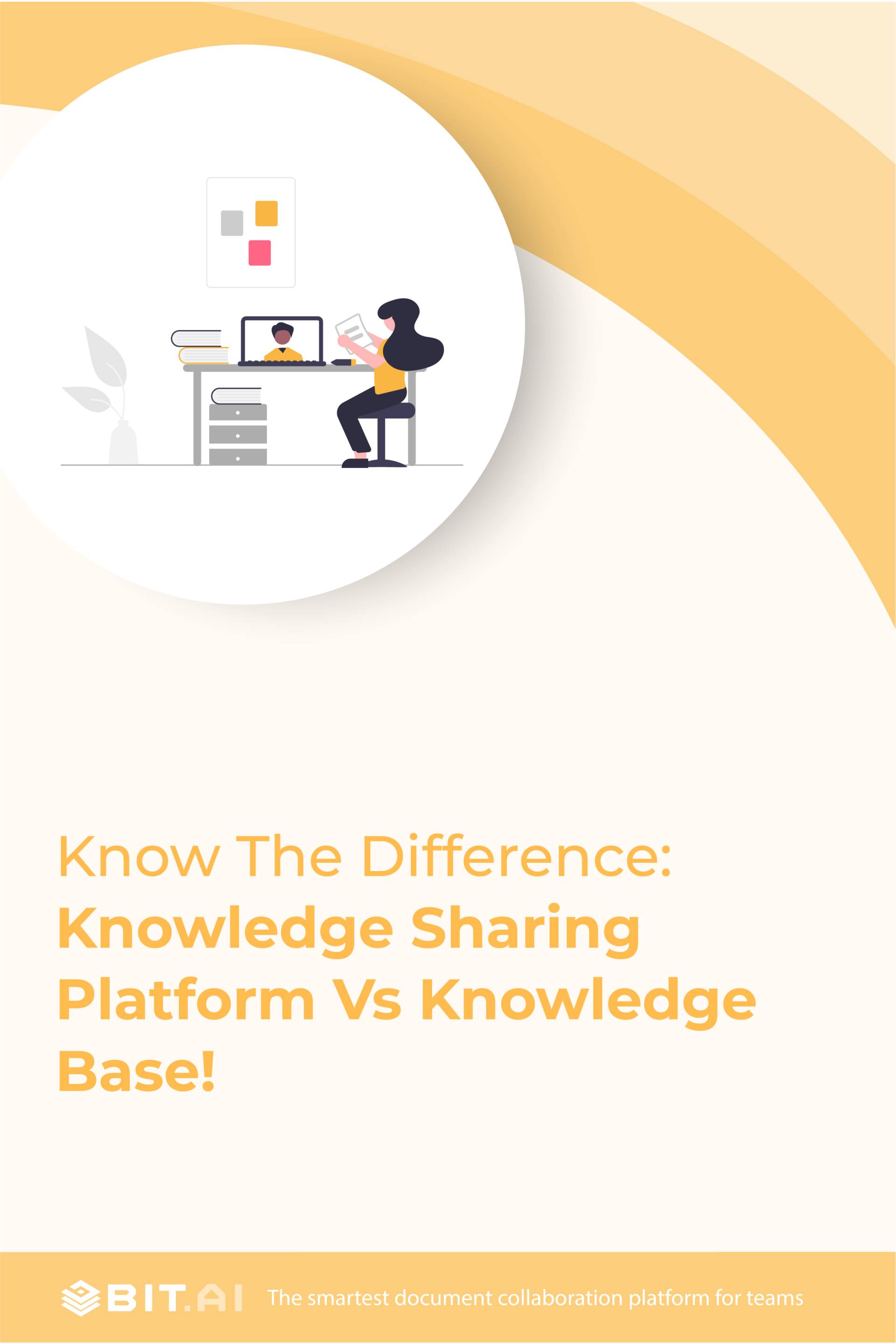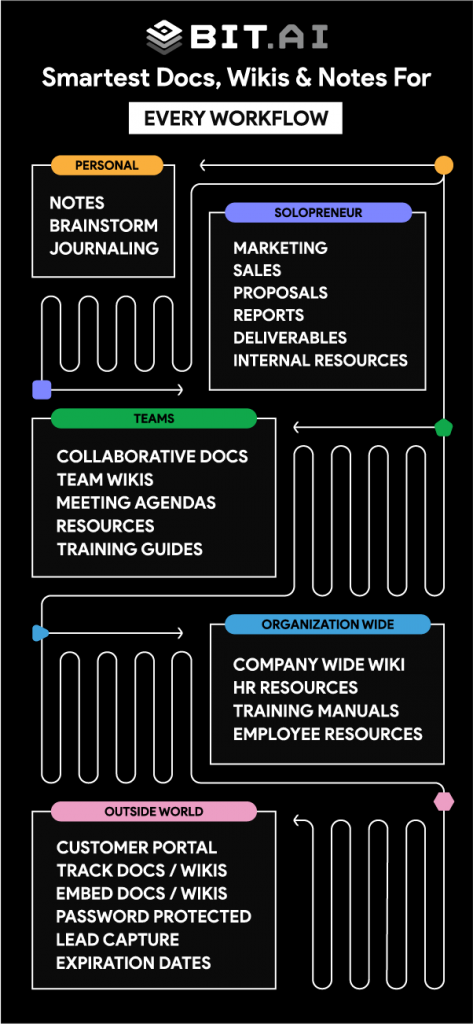“Knowledge is power” is the age-old quote by Sir Francis Bacon that holds even in today’s fast-paced and dynamic world. As businesses grow and evolve, so does the knowledge that underpins their success. But what happens when that knowledge is scattered, disorganized, and inaccessible? Chaos, confusion, and a recipe for disaster.
Imagine you’re running a business, and every time someone has a question about a particular process, product, or service, they need to interrupt you or one of your colleagues to get an answer. Sounds familiar? It’s a common problem for many businesses, and the solution lies in knowledge-sharing platforms and knowledge bases.
A knowledge-sharing platform like bit.ai allows your team members to share their expertise and collaborate on projects seamlessly. It helps build a learning and innovation culture, leading to higher productivity and employee engagement. On the other hand, a knowledge base is a repository of all the critical information about your business, easily accessible to anyone who needs it. It ensures everyone is on the same page, leading to better decision-making and fewer mistakes.
In this article, we’ll explore the benefits of having a knowledge-sharing platform and knowledge base for your organization. We’ll also provide tips on choosing the right platform for your business needs. So, whether you’re a startup or a well-established corporation, join me on this quest for organized knowledge and take your business to new heights. Keep reading!
What is a Knowledge-Sharing Platform?
Unsurprisingly, businesses lose thousands of dollars every year due to the time spent searching for information. On average, employees spend 25% of their time searching for information or asking colleagues for help. That’s like spending one day out of every workweek looking for answers!
Enter the knowledge-sharing platform – a tool designed to make your life easier by seamlessly curating and sharing important information. A knowledge-sharing platform is an online space where employees and teams can collaborate and share their expertise, ideas, and experiences. It creates a centralized repository of information that is easily accessible to everyone in the organization.
So, how does it work? Let’s say you’re working on a project and encountering a tricky problem. Instead of solving it yourself, you can post it on the platform and ask for help. Your colleagues can then weigh in with their expertise, and together you can devise a solution. It’s a win-win situation; everyone learns something new, and the project moves forward.
According to a survey conducted by McKinsey, companies that promote knowledge-sharing and collaboration are 20-25%more likely to outperform their peers. This means having a knowledge-sharing platform can give your business a competitive advantage.
Even the best of things have their limitations. So, before diving in, let’s explore the limitations of knowledge-sharing platforms in the next section.
What are the Limitations of a Knowledge-Sharing Platform?
As valuable as knowledge-sharing platforms can be, they have limitations. Let’s look at some potential drawbacks you should be aware of.
1. Information Overload
With so much information available, it can be overwhelming to sift through it all. It’s essential to have a way to organize and categorize information to make it easier to find what you’re looking for.
2. Quality Control
Not all information is created equal, and ensuring that the information shared on the platform is accurate and reliable can be difficult. Having a system for fact-checking and verifying information is crucial.
3. Cultural Barriers
Knowledge-sharing platforms are often used by teams spread across different countries and cultures. Language barriers, time differences, and different communication styles can all make it challenging to share information effectively.
4. Resistance to Change
Some team members may resist using a knowledge-sharing platform, preferring traditional communication methods. Encouraging and incentivizing their use is key to overcoming this barrier.
5. Security Concerns

Sharing sensitive information on an insecure platform can be risky if proper security measures aren’t in place. Encryption, access controls, and user permissions are all essential to ensure that information is kept confidential.
For example, if you’re working on a project and come across a document containing confidential client information. You need to share it with your team, but you’re hesitant to do so on the knowledge-sharing platform because of security concerns. In this case, having secure access controls and user permissions would alleviate your concerns and make it safe to share the information.
But you don’t have to worry about security issues while using Bit.ai, as it offers security features like password protection and content control to store and share all your information securely.
To summarize this, while there are limitations to knowledge-sharing platforms, these can be overcome with the strategies and the right tools like bit.ai. By being aware of and addressing these limitations, you can make the most of this valuable tool for collaboration and information sharing.
Having done with the knowledge-sharing platform, it’s time to move to the next part of this discussion i.e. Knowledge Base. Things are going to get more exciting now. So, stay tuned.
What is a Knowledge Base?
Have you ever found yourself going through Google and various other platforms, searching for answers to a specific question, only to end up more confused than when you started? Or have you been asked a question at work and spent hours combing through emails and files to find the answer? If so, you’re not alone. And the ultimate solution to all your knowledge problem is a Knowledge Base.
A knowledge base is a centralized database of information about your business, products, services, and processes. It is a one-stop shop for all your team members to access information and find answers to their questions quickly. It contains answers to frequently asked questions, troubleshooting tips, product details, and other important information related to your business that is easily searchable. According to a survey, 60% of customers prefer self-service options, and a knowledge base is an excellent way to provide self-service to your customers.
It’s important to note that a knowledge base differs from a knowledge-sharing platform. While a knowledge-sharing platform allows your team members to share their expertise and collaborate on projects, a knowledge base is a repository of information accessible to everyone.
So, if you want to provide excellent customer service, improve employee productivity, and streamline your business processes, start building a knowledge base today! And similar to what we’ve discussed in Knowledge sharing platform, every tool has certain limitations, no matter how good it is. Jump into the next section and get to know these limitations in brief.
What are the Limitations of a Knowledge Base?
While a knowledge base is essential for organizing information, it has its fair share of drawbacks. Let’s take a closer look at some key limitations you should be aware of.
1. Limited Context
A knowledge base is only as good as the information it contains. However, it’s often difficult to provide context for that information. For instance, let’s say you’re looking for a solution to a technical issue. You might find a relevant article in the knowledge base, but it could be missing crucial details to help you fully understand the problem.
2. Lack of Personalization
Knowledge bases are often designed to be a one-size-fits-all solution. Unfortunately, the information provided might not be relevant to every user. Like, an employee in the sales department might not benefit from the same knowledge base articles as an employee in the IT department.
3. Lack of Information
Many knowledge bases lack a crucial component – a Q&A feature. Without it, users are left to navigate the system alone, limited to the information the administrators deem important enough to include. This can be frustrating and time-consuming, especially if your needed information isn’t readily available.
4. Maintenance Overhead
A knowledge base requires ongoing maintenance to keep it up-to-date and accurate. This can prove to be a time-consuming task for busy employees. Also, if the knowledge base is poorly maintained, it can be more of a hindrance than a help.
5. Inflexibility
Knowledge bases are typically designed to be structured in a specific way. This can make it difficult to add or modify information that doesn’t fit within that structure. For instance, if you want to include a new category or subcategory in the knowledge base, it might not be possible without completely overhauling the existing structure.
6. Dependency on User Input
A knowledge base relies heavily on users to contribute and maintain information. But, not all users possess equal knowledge. Some may not have the expertise to provide accurate information, while others might not be motivated to contribute. This can lead to a knowledge base that is inconsistent or incomplete.
According to a study by the Association for Information and Image Management, nearly 50% of organizations experience difficulty when trying to maintain their knowledge base. Despite these limitations, a knowledge base can still be valuable for many businesses. The key is understanding these limitations and working to mitigate them as much as possible.
Now, if you are confused and can’t decide which platform to choose for managing your company’s knowledge and information, the next section might help. In the next section, we’ve discussed various points that differentiate knowledge-sharing and knowledge-base platforms. It will give you a clear insight into which knowledge management platform best suits your business. So, Read further.
Knowledge Sharing Platform Vs Knowledge Base: The Differences
In knowledge management, two terms often get used interchangeably, but they are very different. Yes, we are talking about knowledge-sharing platforms and knowledge-base platforms. While they deal with knowledge sharing, some significant differences set them apart. Let’s learn about the differences between the two:
1. Scope of Knowledge Management
Knowledge base platforms focus on a specific type of knowledge, such as FAQs or user manuals. On the other hand, knowledge-sharing platforms have a broader scope. They can be used for various knowledge management activities, including project management, customer support, and employee training.
Read More: Knowledge Management Process: A Comprehensive Guide!
2. User Experience
Knowledge base platforms are designed to provide a user-friendly experience for accessing information. They typically have a search function and are organized in a hierarchical structure. Knowledge-sharing platforms, on the other hand, emphasize collaboration and interaction between users, making it easy to share knowledge in real time.
3. Communication
While knowledge-based platforms provide a one-way communication channel where users can access information, knowledge-sharing platforms offer two-way communication channels where users can ask questions, get answers, and discuss topics. This feature makes knowledge-sharing platforms ideal for team collaboration, brainstorming, and problem-solving.
4. Flexibility and Customization
Knowledge base platforms are often rigid in their structure and require specific formatting for uploading and organizing information. And knowledge-sharing platforms are much more flexible, allowing users to upload various types of files and media, and can be customized to fit an organization’s specific needs.
5. Integration with Other Tools

Knowledge-sharing platforms integrate with various tools, including project management software, chat applications, and video conferencing. This feature enhances knowledge-sharing across different departments and enables teams to work collaboratively from remote locations.
Ultimately, the main difference between knowledge-sharing and knowledge-base platforms is that the former is designed for collaboration and two-way communication. In contrast, the latter is designed to provide access to information in a user-friendly manner. Both have their specific advantages and use cases and choosing the right platform depends on an organization’s specific needs and goals.
Wrapping Up
So here we wrap up our discussion where we’ve learned that knowledge-sharing and knowledge-base platforms have unique strengths and limitations.
And if you are looking for a reliable knowledge-sharing platform, then you should check out Bit.ai. Bit.ai is a collaborative workspace that allows teams to share knowledge, collaborate on projects, and create beautiful documents, presentations, and spreadsheets. With features like a user-friendly interface, real-time collaboration, password protection, version history, and integration with other tools, Bit.ai is the perfect platform for knowledge sharing and collaboration. Let’s Bit-ify your knowledge! Sign up now and start exploring!
Further Reads:
Knowledge Management Vs Information Management: The Differences!
Knowledge Sharing Vs Knowledge Management: The Key Differences!
Top Knowledge-Sharing Methods for Enhanced Productivity & Innovation!
Company Wiki Vs Knowledge Base: Understanding The Key Differences!
Top Knowledge Management Examples for Business Productivity!
How to Encourage Knowledge Sharing in the Workplace?
15 Impactful Knowledge-Sharing Quotes For Your Team!

Related posts
Bit.ai | Watch to Learn More
What is Bit.ai?
Bit.ai is an innovative AI-driven knowledge and Document Managment suite designed to empower knowledge workers by streamlining the creation of, documents, wikis, and notes. With an intuitive interface and seamless integration, Bit.ai acts as a versatile assistant to help you collaborate, generate, organize, and visualize your ideas effortlessly. Whether you are drafting a report, managing a project, collaborating with your team or clients, or brainstorming new concepts, Bit.ai brings intelligence and creativity to every aspect of your work process.



